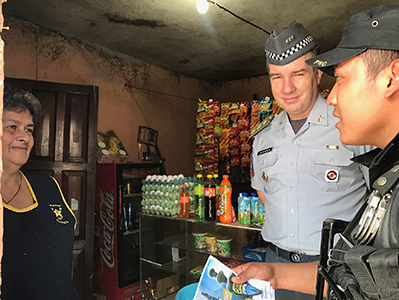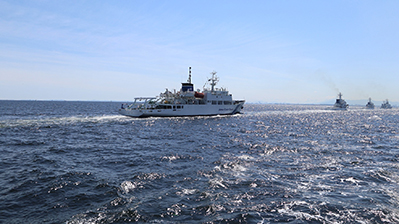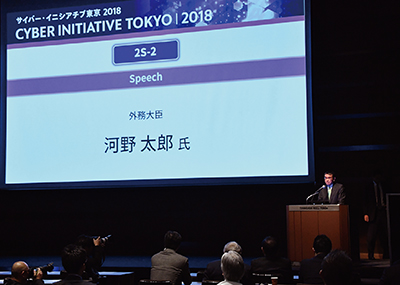(3) Assistance for Security and Stability
Through globalization, the advancement and spread of high-tech devices, as well as the expanded movement of people, transnational organized crime and acts of terrorism have become a threat to the entire global community. In recent years, transnational organized crime, including illicit trafficking of drugs and firearms, trafficking in persons*, cybercrime, and money laundering*, has become increasingly diversified and sophisticated in its methods. Also, through Foreign Terrorist Fighters (FTF) who have been returned or relocated from the battlefields, groups that are affiliated with and influenced by ISIL and other international terrorist organizations are becoming increasingly active not only in the Middle East and Africa, but also in the Asia region. Furthermore, homegrown terrorism (acts of terrorism by those who have grown natively in the country) by individuals influenced by violent extremism also pose a grave threat. In addition, piracy and armed robbery against ships off the coast of Somalia and in the Gulf of Aden in eastern Africa, the Gulf of Guinea in western Africa, as well as in the waters of Southeast Asia, are still a concern.
There are limitations for any one nation to effectively deal with transnational organized crime, acts of terrorism, and piracy. Therefore, not only must each nation strengthen its countermeasures, the entire international community must also work together to eliminate legal loopholes through assistance to build capacity in the fields of criminal justice and law enforcement in developing countries.
■Japan’s Efforts
A. Enhancing the Capabilities of Security Authorities
In the area of capacity building of police agencies that constitute a cornerstone in maintaining domestic security, Japan provides assistance focused on the transfer of knowledge and technology based on the track records and experiences of the Japanese police in international cooperation, while emphasizing human resources development, including enhancement of administrative capabilities and systems.
The National Police Agency (NPA) of Japan dispatches experts to and accepts trainees mainly from Asian countries such as Indonesia, through which Japan explains how democratically controlled Japanese police work and are trusted by the Japanese people.
B. Counter-Terrorism
In 2018, frequent terror attacks continued to take place around the world. Under the current situation of an expanding threat of terrorism and violent extremism not only in the Middle East and Africa but also in Asia, the steady implementation of “G7 Action Plan on Countering Terrorism and Violent Extremism,” formulated at the G7 Ise-Shima Summit, is becoming increasingly important. Japan provides capacity building assistance in counter-terrorism to developing countries that are not necessarily equipped with sufficient counter-terrorism capabilities.

A local police officer communicating with citizens in Guatemala, under the guidance of a Brazilian police officer who participated in JICA’s “Project for Strengthening of Police Human Resources through the Promotion of Community Police Philosophy” (a triangular cooperation project to promote the spread of Japanese-style community police rooted in Brazil, through technical cooperation from Japan). (Photo: JICA)
Japan has announced that under the notion of the “golden mean,” it would provide comprehensive assistance totaling approximately $6 billion, including human resources development for approximately 20,000 people, over the three-year period from 2016 to 2018, to prevent the expansion of violent extremism and build a “tolerant and stable society” in the Middle East. With regard to Africa, at the Security Council Open Debate of the UN Security Council Meeting chaired by Japan in 2016, then Foreign Minister Kishida emphasized Japan’s strong commitment to peace and safety in Africa, and announced that Japan would provide support totaling $120 million (approximately ¥14 billion), including human resources development for 30,000 people, from 2016 to 2018 for counter-terrorism measures in Africa.
Moreover, in Asia, Japan announced at the Japan-ASEAN Summit Meeting held in 2016, that it will provide approximately ¥45 billion over the next three years as comprehensive counter-terrorism assistance in the following areas: (i) improvement of counter-terrorism capacity, (ii) counter-measures to violent extremism as a root-cause of terrorism, and (iii) social and economic development assistance to create a foundation for a moderate society, and that it would also help train 2,000 personnel for counter-terrorism over the next three years. In the past two years, Japan has already yielded significant results exceeding its targets, with assistance of ¥80 billion and the training of 2,653 personnel in the field of counter-terrorism. In addition, Japan, in cooperation with the government of each country and international organizations, is steadily implementing assistance that utilizes Japanese technology, towards the realization of an “Asia resilient to terrorism.” These include the introduction of state-of-the-art equipment for counter-terrorism developed in Japan, such as biometrics authentication systems (face recognition, fingerprint identification, etc.) and detection equipment for explosives and drugs.
C. Measures against Transnational Organized Crime
As globalization advances, the threat of transnational organized crime that is conducted on a large-scale and systematically across different countries is becoming more serious. Transnational organized crime undermines the security of civil society, the rule of law and market economy, which form the foundation of social prosperity and well-being. Thus, transnational organized crime is an issue that needs to be addressed uniformly by the international community. In order to deal with transnational organized crime, Japan concluded the United Nations Convention against Transnational Organized Crime (UNTOC), a legal framework for preventing transnational organized crime including terrorism, and is promoting international cooperation through mutual legal assistance and others, based on the Convention. Additionally, Japan mainly makes the following international contributions.
●Measures against Drug Trafficking
Alongside its active participation in international conferences such as the Commission on Narcotic Drugs under the United Nations, Japan has also provided financial contribution to the United Nations Office on Drugs and Crime (UNODC), to support counter-narcotics efforts. Japan is making efforts to prevent illicit drug trafficking through support to strengthen regulatory capacity in Afghanistan and the neighboring regions where the narcotics problem is particularly serious, as well as border-control assistance mainly in the Asia region.
In addition, the NPA of Japan invites senior drug investigators mainly from the Asia-Pacific region to attend discussions about the narcotics situation in their countries, narcotics crime investigation methods and international cooperation in the field. It is aimed at establishing and strengthening international networks on drug enforcement of relevant countries.
●Measures against Trafficking in Persons
Based on the “2014 Action Plan to Combat Trafficking in Persons” drawn up in 2014, Japan provides various forms of assistance to eradicate trafficking in persons*, which is a serious violation of human rights and an extremely malicious crime. Under this Action Plan, Japan has been publishing annual reports on its efforts to combat trafficking in persons since 2014, while also strengthening cooperation with various ministries, agencies, relevant organizations, and NGOs. Japan is also a party to the Trafficking in Persons Protocol, which is a comprehensive international agreement on trafficking in persons.
With regards to victims of trafficking in persons protected in Japan, Japan assists in the safe repatriation of them, as well as provides support for the social rehabilitation of these individuals in their home country through means such as education and vocational training, in order to prevent them from becoming victims of trafficking in persons again after repatriation, through contributions to the International Organization for Migration (IOM). Additionally, through its financial contribution to the Law Enforcement Agencies Capacity Strengthening Project of UNODC and JICA’s technical cooperation, Japan also contributes to measures against trafficking in persons and efforts to protect victims mainly in Southeast Asia, such as by making financial contributions to and participating in the Bali Process, which is an Asia-Pacific regional framework on smuggling and trafficking in persons, and transnational crime.
●Measures against Money Laundering
There is a high risk that the profits of transnational organized crime would be used to fund further organized crime or acts of terrorism, and thus, eliminating these flows of illicit funds is an important task for the international community. Therefore, Japan actively participates in discussions on international measures against money laundering* and terrorist financing, through intergovernmental frameworks such as the Financial Action Task Force (FATF) established based on the Economic Declaration of the Arch Summit in 1989. Through UNODC, Japan is also engaged in efforts to tackle terrorist financing in Iran and Southeast Asia.
D. Capacity Building for Maritime, Outer Space, and Cyberspace Issues
●The Seas
As a maritime nation, Japan depends largely on maritime transport for the import of much of its energy resources and food. Thus, ensuring maritime safety is an issue that directly links to Japan’s existence and prosperity as a nation, and furthermore, is also of crucial importance for the economic development of the region. However, the threat of piracy exists in the sea lanes between Japan and the Middle East, from which Japan imports large amounts of crude oil, and in the internationally important sea lanes such as off the coast of Somalia, in the Gulf of Aden, and in the Sulu and Celebes Sea. Hence, there is an urgent need to strengthen measures against piracy in these regions.

The 2nd Capacity Building Executive Programme on Combating Piracy and Armed Robbery against Ships in Asia, held for maritime law enforcement officers and other personnel from all ReCAAP contracting parties (20 countries including Japan), as well as Indonesia and Malaysia, in Tokyo, May 2018.
In Asia, for example, to encourage regional cooperation in the fight against piracy and armed robbery against ships in the region, Japan was at the forefront of efforts to formulate the Regional Cooperation Agreement on Combating Piracy and Armed Robbery against Ships in Asia (ReCAAP). Each of the contracting parties shares information regarding piracy and armed robbery against ships and cooperates via the Information Sharing Centre (ReCAAP-ISC) established in Singapore under the Agreement. Japan supports the activities of ReCAAP-ISC by sending its Executive Director and an assistant director, in addition to the provision of financial support. Since 2017, as co-organizer with ReCAAP-ISC, Japan has been conducting training in Japan aimed at building capacity in counter-measures for piracy of maritime law enforcement agencies in ASEAN member states. The second training, held in cooperation with relevant ministries and agencies, was held in Tokyo from May 19 to 25, 2018.
Moreover, in order to establish and promote the “rule of law” at sea, Japan is utilizing tools such as ODA to seamlessly support the improvement of law enforcement capacity of maritime security agencies in ASEAN countries through provision of patrol vessels, technical cooperation, and human resources development, while promoting international cooperation for the capacity building in Maritime Domain Awareness (MDA) among recipient countries. Specifically, Japan is carrying out human resources development through training and the dispatch of experts for maritime countries along the sea including Indonesia and Malaysia, in addition to providing maritime security-related vessels and equipment to Viet Nam, the Philippines, and other countries.
In order to counter the threat of piracy off the coast of Somalia and in the Gulf of Aden in Eastern Africa, Japan has been conducting anti-piracy operations since 2009. Moreover, Japan has contributed a total of $15.1 million to the IMO Djibouti Code of Conduct Trust Fund, which was founded by the International Maritime Organization (IMO) to implement the Djibouti Code of Conduct (a regional framework for Somalia and its neighboring countries). This Trust Fund has been used to establish information-sharing centers for anti-piracy measures and the Djibouti Regional Training Centre, which conducts training programs to improve maritime security capabilities in countries surrounding Somalia. In addition, Japan has contributed a total of $4.5 million to the International Trust Fund to support Somalia and its neighboring countries to improve their capabilities in arresting and prosecuting alleged pirates, in order to assist the international community in its measures to counter and prevent piracy.(Note 10) Also, in cooperation with the Japan Coast Guard, training programs for the control of maritime crime have been carried out with the participation of maritime security officers from the countries around Somalia. Furthermore, with the perception that the reconstruction and stability of Somalia are essential for a fundamental solution to the piracy issue in the area, since 2007, Japan has disbursed approximately $468 million for the restoration of basic social services, improvement of security maintenance capability, and revitalization of domestic industries in Somalia.
Incidents that occur on sea lanes, such as oil leakage from ships, not only have an impact on the safety of ships passing through, but can also cause fatal damageto the fishery and tourism industry of coastal countries by polluting the coast. Hence, it is also important to strengthen the capacity for dealing with such incidents. To that end, Japan has decided to continue to dispatch experts (Advisors for improving oil spill management capabilities) to Sri Lanka, even after FY2018, which is positioned on sea lanes that connect Asia with the Middle East and Africa, to support the strengthening of its capability to manage oil spills at sea.
Furthermore, since 2009, the International Hydrographic Organization (IHO) has been conducting a training program every year in the United Kingdom with the aim of nurturing nautical chart experts in developing countries. This program is carried out with grant assistance from The Nippon Foundation and the participation of the Hydrographic and Oceanographic Department of the Japan Coast Guard in the management of the program. Since its launch, the project has produced 65 graduates from 39 countries. The IHO and UNESCO’s Intergovernmental Oceanographic Commission (IOC) are engaged in a joint project to create the General Bathymetric Chart of Oceans (GEBCO), a topographical map of the world’s seafloor. The map has undergone numerous revisions through the cooperation of experts around the world, including the Hydrographic and Oceanographic Department of the Japan Coast Guard. Also, through the grant assistance offered by The Nippon Foundation, a human resource training program aimed at fostering personnel who can contribute to the GEBCO project has been conducted at the University of New Hampshire in the United States every year since 2004. To date, this program has produced 84 graduates from 37 countries.
●Outer Space
Japan contributes to addressing global issues including climate change, disaster risk reduction, marine/fisheries resource management, forest conservation, and resources/ energy through the implementation of development cooperation and capacity-building assistance utilizing space technology. Japan has also proactively provided assistance in the field of human resources development to emerging countries and developing countries in their efforts toward the development and use of space. In particular, initiatives by Japan such as the provision of an experiment environment that makes use of the International Space Station Japanese Experiment Module “Kibo” and the release of small satellites have been highly evaluated. Small satellites have also been released from Kenya through “KiboCUBE,” a collaborative program between the United Nations and the Japan Aerospace Exploration Agency (JAXA), which provides opportunities to release extremely small satellites from “Kibo.”
In addition to these initiatives, in 2016, in order to strategically and effectively offer all-Japan support for capacity building in developing countries in the field of space, Japan formulated basic policies and reported them to the Strategic Headquarters for National Space Policy. Japan will continue to actively provide support in line with these policies.
●Cyberspace
A free, fair and secure cyberspace is a global shared space that enables communication on a global scale, and is the foundation for peace and security of the international community. However, in recent years, it has become a pressing task to take measures against threats into cyberspace. For this reason, it is necessary for diverse actors in each country to work together to respond to these threats. In this sense, the lack of capacity in some countries including developing countries to respond to the threat pose a significant risk to the entire world including Japan. Furthermore, Japanese people traveling overseas and Japanese companies expanding their business to foreign markets depend on the social infrastructure and cyberspace managed and operated by the host countries. Therefore, strengthening cooperation for ensuring the security of cyberspace in countries around the world and providing capacity-building support to developing countries not only contribute to the recipient countries, but also benefit Japan and the entire world.

Foreign Minister Kono delivering a speech at Cyber Initiative Tokyo 2018, held in December 2018
The Ministry of Internal Affairs and Communications (MIC) has utilized the Japan-ASEAN Integration Fund (JAIF), to which Japan makes financial contributions, to establish the ASEAN-Japan Cybersecurity Capacity Building Centre in Bangkok, Thailand, as well as provide the Cyber Defense Exercise with Recurrence (CYDER), a practical exercise targeted at cybersecurity personnel of government agencies and critical infrastructure operators in ASEAN countries. Through these efforts, Japan promotes cooperation toward capacity-building in the area of cybersecurity in ASEAN.
Moreover, since 2017, the National Policy Agency has been conducting training for staff engaged in combatting cybercrimes at the People’s Public Security of Viet Nam, with the aim of helping them to acquire the knowledge and skills for dealing with cybercrimes, as well as strengthening cooperative relations between the security agencies of Japan and Viet Nam.
- *Trafficking in persons
- The act of recruitment, transportation, transfer, harboring or receipt of persons for the purpose of exploitation, such as forced labor or prostitution.
- *Money laundering
- The act of disguising criminal proceeds as legally obtained assets, or the act of hiding such funds. Example: An act where a drug dealer hides money gained through drug trafficking in a bank account opened under a false name.
- Note 10: From December 2012, the United Nations Development Programme Multi-Partner Trust Fund Office (UNDP-MPTF Office) took over the management of funds from UNODC.
